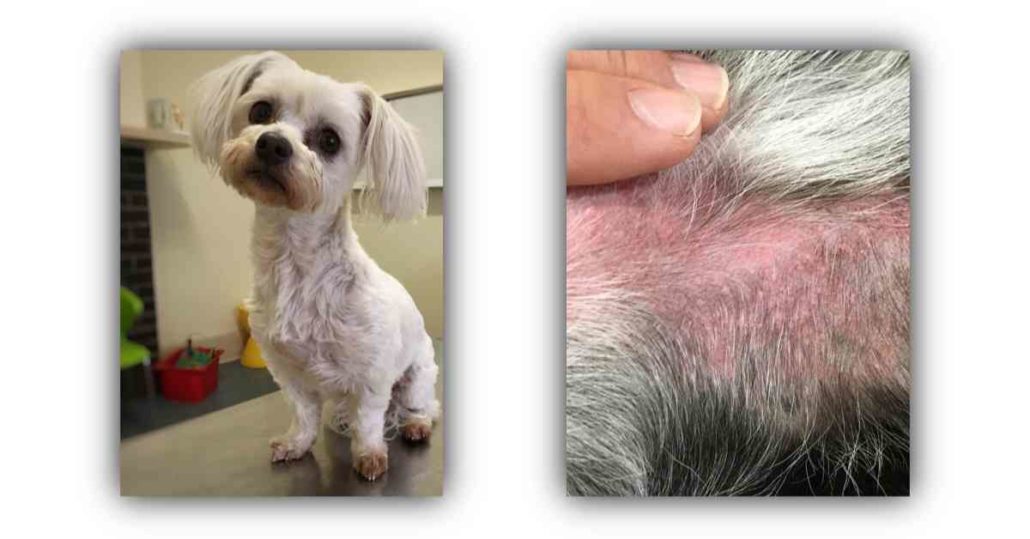Certain ingredients in flea control products have been known to cause more side effects than others. Occasionally hair loss also occurs.
Can Flea Medicine Cause Hair Loss In Dogs, Can flea medicine cause hair. Hair loss in dogs and cats is generally caused by medical or behavioral problems.

If your pet shows signs of an allergic reaction (facial swelling, itchiness, hives, diarrhea, seizures, or shock) seek veterinary care immediately. Rid your cat of fleas using a cycle of flea shampoos and treatments. Occasionally hair loss also occurs. Demodectic mange is one of.
Environmental, flea, and food allergies.
Flea bites trigger an allergic reaction in some cats, resulting in irritated skin and hair loss. Are fleas going to fleas affect my dog? An allergy may be the most common reason for dog hair loss. Though because the pet has sensitive skin, they will sometimes lose some of the fur around the site where you put the treatment. Signs of a flea allergy in dogs if you see itching in your dog, and it leads to hair loss on the middle of the back to the tail base, you need to think flea allergy dermatitis. In addition to any signs of hair loss and the skin being reddened and irritated, your pet might also have chronic scratching episodes.
 Source: totalpooch.com
Source: totalpooch.com
Hair loss in dogs and cats is generally caused by medical or behavioral problems. Itching and hair loss in the region from the middle of the back to the tail base and down the rear legs (the flea triangle) is often associated with fad. Intradermal allergy tests (skin tests similar to those performed in humans) or specialized blood tests (ige.
 Source: hoggarthdesigns.blogspot.com
Source: hoggarthdesigns.blogspot.com
Over time, allergic dermatitis can lead to dry and flaky skin or oily, greasy skin. One very common cause is flea allergic dermatitis. Intradermal allergy tests (skin tests similar to those performed in humans) or specialized blood tests (ige blood tests) can confirm flea allergy in your dog. This is when your dog is allergic to the flea saliva. Sometimes,.
 Source: petmd.com
Source: petmd.com
This is when your dog is allergic to the flea saliva. Though because the pet has sensitive skin, they will sometimes lose some of the fur around the site where you put the treatment. Abnormalities in the skin were limited to the application site and were. The hair loss can spread all over the body, up to the head and.
 Source: whitehorsevet.com.au
Source: whitehorsevet.com.au
The cat or dog may end up suffering from hair loss. The scratching and irritation cause the hair to fall out, leading to your dog having a sparse hair coat. Over time, allergic dermatitis can lead to dry and flaky skin or oily, greasy skin. Sometimes, substances released by the dying parasites may cause an allergic reaction, especially if fenbendazole.
 Source: walkervillevet.com.au
Source: walkervillevet.com.au
Over time, allergic dermatitis can lead to dry and flaky skin or oily, greasy skin. Are fleas going to fleas affect my dog? Localized hair loss is one of them. Acne medication, such as isotretinoin (absorica and accutane) antibiotics, such as penicillin, cephalexin, and erythromycin. Symptoms can take several weeks to clear up even after the fleas are gone, so.
 Source: petcentral.chewy.com
Source: petcentral.chewy.com
In addition to any signs of hair loss and the skin being reddened and irritated, your pet might also have chronic scratching episodes. Dogs with high levels of separation anxiety may lick patches of hair off their legs (acral lick dermatitis). This is when your dog is allergic to the flea saliva. In layman’s terms, it’s inflammation of the skin.
 Source: etsy.com
Source: etsy.com
In layman’s terms, it’s inflammation of the skin due to an allergic reaction. Yeast and bacteria may always be present in your dog’s fur at a small level, but a build up of these can lead to an infection. An allergy may be the most common reason for dog hair loss. Sometimes, substances released by the dying parasites may cause.
 Source: canna-pet.com
Source: canna-pet.com
Injected vaccines may result in hair loss at the injection site and further widespread hair loss later. Injected vaccines may result in hair loss at the injection site and further widespread hair loss later. These chemicals effectively treat a flea infestation, but they can cause various side effects to your dog. Flea bites trigger an allergic reaction in some cats,.
 Source: petcoach.co
Source: petcoach.co
The scratching and irritation cause the hair to fall out, leading to your dog having a sparse hair coat. Sarcoptic mites invade and live under the superficial layer of the skin causing alopecia in dogs and cats. Their bites itch, so pets lick and chew there. In cats and dogs, the most common cause of hair loss in that area.
 Source: br.pinterest.com
Source: br.pinterest.com
Side effects to a dog flea control product include irritation or redness where a topical product was placed, hair loss, vomiting, lethargy, and diarrhea. Hair loss in dogs and cats is generally caused by medical or behavioral problems. Sometimes, substances released by the dying parasites may cause an allergic reaction, especially if fenbendazole is given at higher than regular doses..
 Source: wagwalking.com
Source: wagwalking.com
Can flea and tick medicine cause hair loss. Flea infestation health risks also include allergic dermatitis. In layman’s terms, it’s inflammation of the skin due to an allergic reaction. Hair loss and skin irritations. “and if that one flea becomes a hundred fleas, or even 10 fleas, the reaction is going to be worse.” in some dogs, a single flea.

The scratching and irritation cause the hair to fall out, leading to your dog having a sparse hair coat. If your dog�s skin was red and itchy before she took the flea medication, the fleas themselves rather than the medicine may be causing the problem. Fortunately, the flea dirt is typically visible, which means you can determine the kind of.
 Source: canna-pet.com
Source: canna-pet.com
We discovered a clinically proven natural formula that targets the root cause of hair loss and allows your hair follicle to generate new hair and keep it there for years to come. Are fleas going to fleas affect my dog? Click to see full answer. What happens if a dog has fleas for a long time? Minor skin irritation is.
 Source: bestreviews.com
Source: bestreviews.com
Itching and hair loss in the region from the middle of the back to the tail base and down the rear legs (the flea triangle) is often associated with fad. Can flea and tick medicine cause hair loss. Side effects to a dog flea control product include irritation or redness where a topical product was placed, hair loss, vomiting, lethargy,.
 Source: petmd.com
Source: petmd.com
Sometimes flea bites cause an allergic reaction called flea allergy dermatitis. The presence of ticks, fleas, and lice can cause inflammation and subsequent hair loss in dogs. Sometimes, substances released by the dying parasites may cause an allergic reaction, especially if fenbendazole is given at higher than regular doses. Causes of hair loss in pets may include fleas, skin infections,.
 Source: pinterest.com
Source: pinterest.com
We discovered a clinically proven natural formula that targets the root cause of hair loss and allows your hair follicle to generate new hair and keep it there for years to come. It can also cause cracking and skin thickening on footpads and joints. One very common cause is flea allergic dermatitis. Topically applied flea medications can cause hair loss.
 Source: dogsbarn.com
Source: dogsbarn.com
In layman’s terms, it’s inflammation of the skin due to an allergic reaction. Rid your cat of fleas using a cycle of flea shampoos and treatments. Symptoms can take several weeks to clear up even after the fleas are gone, so talk to your veterinarian if your dog�s. Minor skin irritation is common at the site of application, especially if.
 Source: fleabites.net
Source: fleabites.net
In layman’s terms, it’s inflammation of the skin due to an allergic reaction. Sometimes, substances released by the dying parasites may cause an allergic reaction, especially if fenbendazole is given at higher than regular doses. An allergy may be the most common reason for dog hair loss. If your dog�s skin was red and itchy before she took the flea.
 Source: hamiltonanimalcare.com
Source: hamiltonanimalcare.com
🐶 can worm medicine cause seizures in dogs? Occasionally hair loss also occurs. Flea bites trigger an allergic reaction in some cats, resulting in irritated skin and hair loss. A zinc deficiency, for example, can lead to hair loss. Itching and hair loss in the region from the middle of the back to the tail base and down the rear.
 Source: hairlosshelp06.blogspot.com
Source: hairlosshelp06.blogspot.com
If hair thinning or loss was observed, a skin biopsy sample was collected. If your pet shows signs of an allergic reaction (facial swelling, itchiness, hives, diarrhea, seizures, or shock) seek veterinary care immediately. In cats and dogs, the most common cause of hair loss in that area is fleas. If your dog�s skin was red and itchy before she.
 Source: ehow.co.uk
Source: ehow.co.uk
The cat or dog may end up suffering from hair loss. Occasionally hair loss also occurs. Fortunately, the flea dirt is typically visible, which means you can determine the kind of allergy the dog is suffering from. Topically applied flea medications can cause hair loss at the application area. Demodectic mange is one of.
 Source: pinterest.com
Source: pinterest.com
Environmental, flea, and food allergies. If your dog�s skin was red and itchy before she took the flea medication, the fleas themselves rather than the medicine may be causing the problem. Causes of hair loss in pets may include fleas, skin infections, allergies,. Similarly, it is asked, can flea drops cause hair loss? Over time, allergic dermatitis can lead to.
 Source: dogster.com
Source: dogster.com
Sometimes flea bites cause an allergic reaction called flea allergy dermatitis. Sarcoptic mites invade and live under the superficial layer of the skin causing alopecia in dogs and cats. You may also treat the itching and hair loss with corticosteroids or. Topically applied flea medications can cause hair loss at the application area. Over time, allergic dermatitis can lead to.
 Source: dogster.com
Source: dogster.com
Are fleas going to fleas affect my dog? In layman’s terms, it’s inflammation of the skin due to an allergic reaction. Though because the pet has sensitive skin, they will sometimes lose some of the fur around the site where you put the treatment. A zinc deficiency, for example, can lead to hair loss. In addition to any signs of.
 Source: trudog.com
Source: trudog.com
Stiffening or the damp appearance of hair, itchiness, redness or pinkish skin may occur but these are temporary side effects. Another common cause is atopic dermatitis. When the flea bites your dog, it causes intensive itching and therefore scratching. Flea bites trigger an allergic reaction in some cats, resulting in irritated skin and hair loss. Environmental, flea, and food allergies.










